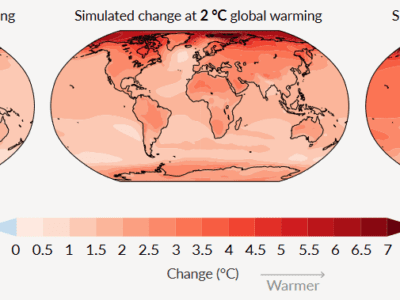Tell Your Reverend To Go Jump In The Lake
Dan, your post is thoroughly persuasive to me, but I’m not sure that it would persuade many climate skeptics. There are two reasons for this:
1) You assume that there is at least a 50/50 chance of climate change occurring. That is a highly conservative assumption — except for climate skeptics. Most climate skeptics are not unpersuaded by the science based upon scientific reasoning: they believe that climate change is hoax being perpetrated by a liberal cabal. So at best, they would put the possibility of climate change occurring at 10/90.
2) Your model relies upon climate change making the drought more likely. I’m actually not persuaded that this necessarily would be true, although I accept your reasoning in general. In many areas, even according to widely-accepted scientific models, some areas of the earth — for example, the Indian monsoon-affected areas — will become wetter, not dryer. That’s not true of Vegas, of course. But more to the point here — again, climate skeptics reject the prevailing scientific models as not just imprecise or inaccurate, but fraudulent.
Recall what you have to believe in order to be a climate skeptic. You have to reject the broad and deep consensus of the global scientific community, a consensus so broad and so deep that virtually NO climate scientist disbelieves it. If you’re going to reject that, it’s easy to reject all other assumptions.
Your basic problem, Dan, is that you are a reasonable and thoughtful person, who is trying to persuade people based upon reason. That’s not really what’s going on here. It reminds me of an incisive analogy developed by John Cole of the blog Balloon-Juice. Cole used to be a conservative Republican, and left because of the Right’s rejection of scientific data. Early in the Obama Administration, when inside the Beltway pundits were all talking about “bipartisanship,” he commented:
I really don’t understand how bipartisanship is ever going to work when one of the parties is insane. Imagine trying to negotiate an agreement on dinner plans with your date, and you suggest Italian and she states her preference would be a meal of tire rims and anthrax. If you can figure out a way to split the difference there and find a meal you will both enjoy, you can probably figure out how bipartisanship is going to work the next few years.
The record over the last year and a half has overwhelmingly confirmed Cole’s argument.
In my view, this contains a tactical takeaway point: don’t try to persuade the climate skeptics. Try to persuade those who don’t have well-formed views. Maybe that’s a better way to frame what you’re doing in your post. Dan, no matter how much you try to convince Rush Limbaugh of the reasonableness of your position, he ain’t interested. He’ll still call you a pinko Commie quiche-eating socialist who wants to rob us of our Precious Bodily Fluids. And not only because you live in Berkeley.
Reader Comments
One Reply to “Tell Your Reverend To Go Jump In The Lake”
Comments are closed.






Jonathan–I have to admit that there’s a lot of realism behind your observations. Certainly, the people who tend to make themselves heard on the internet aren’t likely to be interested in thinking about nuances like probability theory. I would hope that there are some quieter, more thoughtful people out there who have doubts about climate science but not a fanatical attachment to skepticism, but the kind of argument I’m making may be too nuanced to interest them.
Apart from the question of whether skeptics are influenced, the analysis that I presented can be useful if we’re interested in proof of causation, which might be relevant to compensation issues or more broadly to questions of climate justice. On the whole, the climate models suggest higher variance and therefore more severe weather events. One case where the attribution claim is pretty strong relates to the thousands of deaths in the European heat wave. Without climate change, that heat wave was so unlikely that the occurence of the heatwave virtually carries the signature of climate change. In that situation, a comparison of the climate change case and the counterfactual non-climate change scenario along the lines I suggest is very convincing.